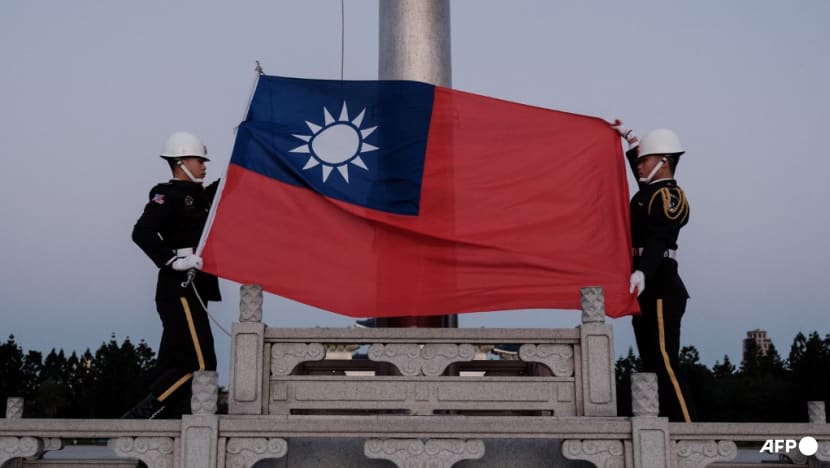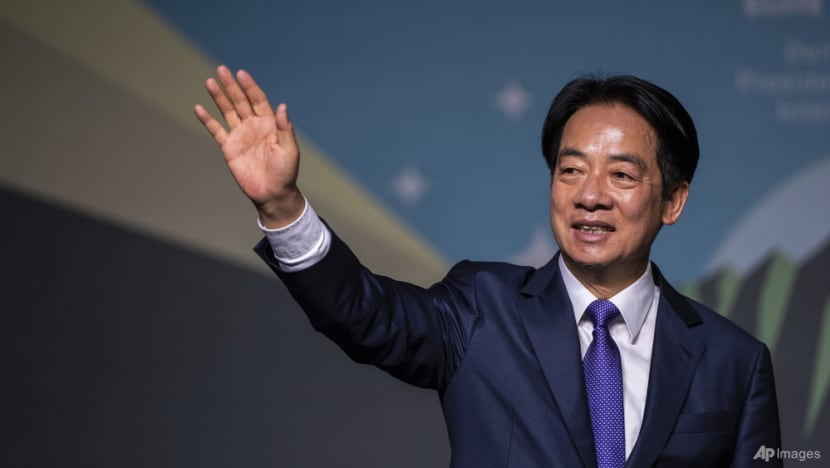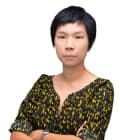Analysis: The way forward for Taiwan and the region after the elections
Taiwan’s independence-leaning Democratic Progressives have held onto power. How will China react to this? And what does it mean for politics on the island?


This audio is generated by an AI tool.
TAIPEI: China is likely to keep up military and economic pressure on Taiwan as incoming president Lai Ching-te prepares to take over the reins from Ms Tsai Ing-wen, but tensions are unlikely to turn into an “all-out invasion”, analysts believe.
They were speaking a day after Taiwan’s presidential and legislative elections held on Jan 13. Mr Lai, 64, won 40.05 per cent of the presidential vote, ahead of his rivals Mr Hou Yu-ih of the Kuomintang (KMT) with 33.49 per cent, and Dr Ko Wen-je of the Taiwan People's Party (TPP) with 26.46 per cent.
While the outcome marks a historic third term in power for the DPP, it is also the party’s second-lowest winning vote share in a presidential election since Taiwan began direct presidential elections in 1996.
Coupled with the loss of its legislative majority, the DPP will need to find ways to strengthen its support base, experts say. The same applies to the other parties.
CHINESE COERCION EXPECTED TO CONTINUE
Security and political experts do not expect Beijing to resume official dialogue with Taiwan under Mr Lai. Formal communications were halted in 2016 after the DPP’s Tsai Ing-wen won the presidency.

They widely expect China to continue its “coercive approach” towards Taiwan, which it sees as part of its territory to be unified with the mainland – by force if necessary.
This could include economic sanctions as well as more frequent incursions into Taiwan’s Air Defence Identification Zone (ADIZ), said Dr Arthur Ding of Taiwan’s National Chengchi University (NCCU).
He was speaking at a post-election outlook media session organised by NCCU’s Election Study Center, think tank The Prospect Foundation and Taiwan’s Ministry of Foreign Affairs on Sunday (Jan 14).
There were over 1,600 Chinese incursions in 2023, according to the United States-based Missile Defence Advocacy Alliance.
The experts pointed to a statement issued by China’s Taiwan Affairs Office shortly after the election results. The DPP does not represent the Taiwanese mainstream public’s opinion, and the election cannot change the “basic pattern and development direction of cross-strait relations”, said spokesperson Chen Binhua.
Taiwan’s Foreign Affairs Ministry issued a statement after, calling on Beijing to “respect the election results, face reality and give up oppression against Taiwan.”
“Only by doing so can positive cross-strait interactions return to the right track as soon as possible,” the ministry added.
“China will most likely continue with its existing policies of pressuring Taiwan militarily and economically to abandon its independence-leaning activities,” Dr Huang Chin-Hao, an associate professor of political science at the National University of Singapore (NUS), told CNA.
“It may wait and see the lineup of Lai's cabinet, how the legislative politics and potential coalition shake out, and the content of Lai's inauguration speech to reassess whether a new policy toward Taiwan is warranted,” said Dr Huang, who is also author of “Power and Restraint in China’s Rise”.
The likelihood of an “all-out invasion” in the next several years is low, said Dr Ding.
There are a few dates to look out for in the coming months, said Dr Lai I-chung, president of The Prospect Foundation.
One is in early March, when China will hold its “two sessions” meetings, its most important event on the political calendar. The annual meetings of the country’s top legislature and political advisory body could yield hints on Beijing’s strategy towards Taiwan.
In the summer, Mr Lai, who will be inaugurated on May 20, could make his first overseas trip, said Dr Lai. While he does not know “which country will provide the opportunity”, Dr Lai believes such a trip could provide an “important stepping stone” for the president to “have a personal engagement with friends in the US”.
The Asia Pacific Economic Cooperation summit in Peru in November is also worth watching for who would represent Mr Lai to attend it, he said. Taiwan has appointed Taiwan Semiconductor Manufacturing Company (TSMC) founder Morris Chang as its special envoy to the summit five times, but Dr Chang is in his 90s, noted Dr Lai.
Some speculate President Tsai, who would have stepped down by then, could be appointed, he said. But a question is whether she would be able to attend, as Peru is known to have a “fairly good relationship with China”.
MORE DRAMA IN PARLIAMENT
With the DPP losing its legislative majority, Mr Lai also vowed in his victory speech to forge an environment of cooperation and consultation with his electoral opponents.
It is now effectively a hung parliament in Taiwan’s 113-seat legislature, with the KMT holding 52 seats, the DPP with 51 and the TPP with eight.The remaining two seats were won by independent candidates.
Forging broader consensus on the future direction of Taiwan's domestic agenda and cross-strait policy is going to be even more important and urgent to avoid political gridlock, said NUS’ Dr Huang.
The DPP will need to work with other parties, “most likely starting with Ko's party”, he said.
The silver lining is that the DPP will need to temper any impulses to change the status quo unilaterally, said Dr Huang. It will need to look for common ground with Dr Ko's TPP to “identify and push for functional, pragmatic exchanges with Beijing, as well as to focus on bread-and-butter issues” like affordable housing, social welfare programmes and healthcare.
“On defence and national security, such consensus-seeking and forging exercise is going to be equally important if the DPP wants to continue to invest in Taiwan's defence and deterrence capabilities,” he added.
While Mr Lai is expected to continue Ms Tsai’s cross-strait, foreign and defence policies, implementation will be complicated by domestic politics, said The Prospect Foundation’s Dr Lai.
Without a parliamentary majority, DPP officials will spend more time being grilled in the legislature than on policy making, said sociologist Chen Ming-chi of National Tsing Hua University.
Mr Lai will have a challenging time pushing his agenda through, including the government budget, added Dr Chen. “We’re going to see a lot of drama, but I would not expect that there will be any major policy change.”
A big factor is whether the parliamentary majority will be formed by a fixed coalition of parties, or ad hoc partnership based on the issues at hand, he said.
Dr Chen cited renewable energy as an example where the KMT and TPP could cooperate as both parties advocate for more nuclear energy, unlike the DPP.
After the results on Saturday night, Dr Ko indicated that the TPP, as the crucial minority, will not have a fixed coalition partner. “We will support whoever makes sense,” he told supporters.
THE KUOMINTANG’S DILEMMA
In the wake of the elections, all parties are left with important issues to reflect on, but perhaps none more so than the KMT.
The KMT is internally conflicted in its position on China, and must resolve this dilemma if it is to stay relevant and have a hope of returning to the presidency, experts said.
This was encapsulated in an incident a few days before the election. Former president Ma Ying-jeou of the KMT said in an interview that Taiwan “can never win” in a war against China, and that it has no choice but to trust President Xi Jinping on cross-strait issues.
The view that Mr Ma expressed cost the KMT votes, said Dr Ding, adding that the party does not realise that the “1992 consensus” – the “one China” principle – no longer has popular support in Taiwan.
“Instead of pointing fingers at the other party, they need to really think about how they can help to get rid of Ma’s influence,” said the professor.
Mr Hou ran quite a different campaign from past KMT candidates, trying to strike a balance between the party’s traditional base of nationalist supporters and appealing to more “Taiwanese-identifying” voters, said Dr Tsai Chia-hung of the National Chengchi University’s Election Study Center.
But KMT politicians face structural limits because of their constituents, who are usually older and believe that China provides the answer to any issue Taiwan faces, said Dr Chen.
This puts in place a “strong limit” on the policy choices the KMT’s candidates can make, and can even be a ceiling on its vote share, he added.
Going forward, Dr Chen said he saw less opportunity for the KMT to gain political ground, and that it would become less influential in Taiwan’s politics.
It appears that some party members, though, are aware of what needs to change.
KMT legislator Lee Guei-min, who provided election commentary on broadcaster TVBS, said: “The KMT needs to reflect deeply on itself and find ways to get the votes of middle-ground voters, young people and women, so that people can feel its transformation.”
WINNING OVER YOUTHS
While the KMT could wane in influence, the TPP could continue to rise, although experts were divided on whether the party was a flash in the pan or not.
The TPP capitalised on the anger of young people, who were unhappy about domestic issues like housing prices and felt alienated from President Tsai’s government, said Dr Chen.
He doubts that the TPP is a “one-time phenomenon” and expects it to stay relevant in Taiwan’s politics.
Expressing a different view, Dr Lai said the TPP has not managed to shed its image of being a “one-man party”, and relied on Dr Ko’s charisma to increase its five legislator-at-large seats to eight.
The TPP has no district-level legislators. Dr Lai said that without a platform for former Taipei mayor Dr Ko to perform in the next four years, the party’s influence and votes would dwindle.
As for the DPP, the key thing it will need to study is how it can appeal to younger voters, who are not loyal to any one party, said Dr Lai.
The DPP earned about 600,000 more votes in the presidential ballot than the party ballot. This suggested that voters chose the DPP’s presidential ticket on the basis of personal affinity with the candidates, particularly Mr Lai’s running mate Ms Hsiao Bi-khim.
“But as a party they do not feel that kind of attachment,” Dr Lai said.
The message sent in this election was that “people think the DPP is old”, said Dr Chen, pointing out that the one thing missing from Mr Lai’s victory speech was a message to young people.





















